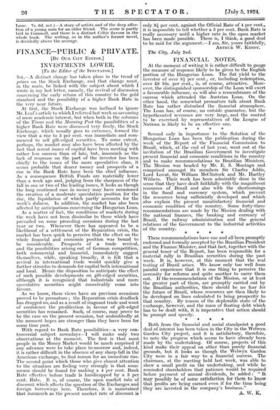FINANCE-PUBLIC & PRIVATE.
[BY OUR CITY EDITOR.] INVESTMENTS LOWER. [To the Editor of the SPECTATOR.] SIR,—A distinct change has taken place in the trend of prices on the Stock Exchange, and that change must, in the main, be linked with the subject about which I wrote in my last letter, namely, the revival of discussion concerning the early return of this country to the gold standard and the possibility of a higher Bank Rate in the very near future. At first, the Stock Exchange was inclined to ignore Mr. Leaf's article to which I referred last week as savouring of mere academic interest, but when both in the columns of the Times and the Morning Post the possibilities of a higher Bank Rate were discussed very freely, the Stock Exchange, which usually goes to extremes, formed the view that a rise to 5 per cent. was immediate and com- menced to sell gilt-edged securities. To some extent, perhaps, the market may also have been affected by the fact that recent issues of capital have been meeting with rather less success than of late, but, inasmuch as the lack of response on the part of the investor has been chiefly to the issues of the more speculative class, it seems probable that dearer money and prospects of a rise in the Bank Rate have been the chief influence. As a consequence British Funds are materially lower than a week ago and, judging from the sharpness of the fall in one or two of the leading issues, it looks as though the long continued ease in money may have occasioned the creation of a moderate speculative position for the rise, the liquidation of which partly 'accounts for the week's dulness. In addition, the market has also been affected by anticipations concerning the Hungarian Loan.
As a matter of fact, the conditions of markets during the week have not been dissimilar to those which have prevailed on some preceding occasions during the last year or two. Whenever there has appeared to be a likelihood of a settlement of the Reparation crisis, the market has been quick to perceive that the effect on the whole financial and economic position was bound to be considerable. Prospects of a trade revival, and the possibilities arising out of German competition, both commercial and financial, immediately suggest themselves, while, speaking broadly, it is felt that a revival in international trade would quickly give a further stimulus to demands for capital both international and local. Hence the disposition to anticipate the effect of such possible developments on gilt-edged securities, although it is recognized that industrials and more speculative securities might conceivably come into favour.
As we know, these views have on previous occasions proved to be premature ; the Reparation crisis deadlock has dragged on, and as a result of stagnant trade and want of confidence the predilection in favour of gilt-edged securities has remained. Such, of course, may prove to be the case on the present occasion, but undoubtedly at the moment hopes are stronger than they have been for some time past.
With regard to Bank Rate possibilities—a very con- troversial subject nowadays—I will make only two observations at the moment. The first is that most people in the Money Market would be much surprised if any advance were to take place to-morrow and, indeed, it is rather difficult in the absence of any sharp fall in the American exchange, to find reason for an immediate rise. The second point which those who give closest attention to the situation are feeling very strongly is that some means should be found for making a 4 per cent. Bank Rate effective before trade is handicapped by a 5 per cent. Rate. It is, of course, the open market rate 'of discount which affects the question of the Exchanges and foreign borrowings here. Therefore, it is maintained that inasmuch as the present market rate of discount is only 81 per cent. against the Official Rate of 4 per cent., it is impossible to tell whether a 5 per cent. Bank Rate is really necessary until a higher rate in the open market has been made possible. There is, I think, a good deal to be said for the argument.—I am, Sir, yours faithfully, ARTHUR W. KIDDY. The City, July 2nd.


















































 Previous page
Previous page